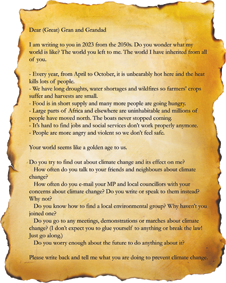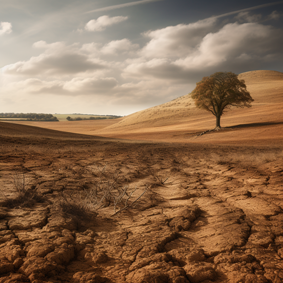Dear (Great) Gran and Grandad
I am writing to you in 2023 from the 2050s. Do you wonder what my world is like? The world you left to me. The world I have inherited from all of you.
Every year, from April to October, it is unbearably hot here and the heat kills lots of people.
We have long droughts, water shortages and wildfires so farmers’ crops suffer and harvests are small.
Food is in short supply and many more people are going hungry.
Large parts of Africa and elsewhere are uninhabitable and millions of people have moved north. The boats never stopped coming.
It’s hard to find jobs and social services don’t work properly anymore.
People are more angry and violent so we don’t feel safe.
Your world seems like a golden age to us.
Do you try to find out about climate change and its effect on me?
How often do you talk to your friends and neighbours about climate change?
How often do you e-mail your MP and local councillors with your concerns about climate change? Do you write or speak to them instead? Why not?
Do you know how to find a local environmental group? Why haven’t you joined one?
Do you go to any meetings, demonstrations or marches about climate change? (I don’t expect you to glue yourself to anything or break the law! Just go along.)
Do you worry enough about the future to do anything about it?
Please write back and tell me what you are doing to prevent climate change.

The letter above could have been found ragged and torn and blowing in a sporadic breeze around what looks a little like Colmer’s Hill in Dorset. It asks some tough questions.
Even for those of us that don’t have any (great) grandchildren, this still concerns us. Our friends and neighbours probably do, and we may have nieces and nephews. We all have a responsibility.
Philip Browne, who drafted the original letter explained why:
‘In August, The Marshwood Vale Magazine printed a letter claiming to be from the future. Written by a child in the 2050s, it challenged us to reflect on what we are doing individually to avert the disaster of climate change.
Of course, it was not actually written by a young person from the future but by me, a 74-year-old pensioner from the here and now. I follow the news on TV, radio and in the papers so I have heard of climate change. I am no expert but know we are approaching a tipping point where it will become unstoppable. By 2050 we may already have passed that point but I won’t be around to see it. It is our children and grandchildren who will face the disaster of global warming.
One reply contained an impressive list of personal actions that benefit the climate but the truth is that none of us can stop climate change on our own. Changes we make in our personal lives—eating less meat, flying less often, buying a hybrid car—help but only governments can take the big decisions that will make a real difference.
Together we must put pressure on our politicians (local and national) to keep climate change at the forefront of what they do. How? Send e-mails to your MP and local councillors by going to the website ‘Write To Them’ at www.writetothem.com If you enter your post code, you’ll find a link to them. Don’t just write once. Do it regularly.
Visit the websites of environmental organisations to see if there is a local group near you. If they have organised an event or meeting, go along and take a look.
Some research shows that if 3.5% of the population actively support a cause, governments take notice and respond. Our present government wants to maintain the status quo but we need to strive for a better, sustainable future. There will be elections soon. Use your vote to elect politicians who genuinely believe in that future.
In the last month we have had record temperatures in China and South America, and deadly fires in Portugal and Hawaii. We must not lose hope but we must act now.‘
Philip Browne
Below are two of the responses Philip received:
Dear Sir,
I can only agree with your article “Letter for the Future”: climate change is real, it’s upon us, it’s all our responsibilities to take up arms and it’s time I consider the gap between what I am doing and what I should be doing.
I know I should eat less, especially meat; I should travel less, especially by plane; I should buy less, especially clothes and I should wash less, especially in warm water. I should make, mend and grow more rather than go shopping. And if I do go shopping, I should consider whether anything I buy is the greenest option.
And tomorrow I will.
I know that I should invest more of my savings in the technology that might save us; Carbon capture, tidal energy, solar energy. I should send regular money to the kinds of organisations that are working hardest to mitigate climate change; e.g. Greenpeace and the National Trust and set up a monthly direct debit to National Geographic and the Guardian on the grounds that they explain the science most clearly.
And I will
I should virtually and face to face seek solidarity and community with those who I agree with. I should contact people who are already making a difference (like the mermaid who brightened Weymouth Esplanade to protest about sewage being dumped in the sea, or Guy Shrubsole for his work on restoring Britain’s rainforests)
And I’ll start today
Someone has to write the Climate crisis equivalent of ‘We shall overcome” or “I have a dream’ , someone has to write the poem that captures the moment when anxiety turns to action, needs to create the definitive meme. It probably won’t be me, but it’s worth having a go.
What I have been doing and enjoying is reconsidering gardening. In January I bought a small field which had been used for pigs and have since been trying to learn from the many Dorset ‘rewilding’ projects: farmers and landowners who are improving biodiversity and soil structure on their land so that, like trees, it supports many more invertebrates and can soak up much more carbon dioxide. I’ve planted about 400 trees (some bought, some given to me, some rescued), I’ve battled thuggish plants like docks and bracken and have tried to replace them with plants, bushes, trees with the flowers, fruit, berries that nourish wildlife. I’ve also planted apple and other fruit and nut trees and have brought piles of rotting wood. Already, there are masses of insects, butterflies, birds as well as deer, rabbits, squirrels and woodpeckers. Next I intend to make, if not a pond, at least a big wet patch.
Finally, I should write to my representatives and prospective representatives and tell them what I want from them:
An acceptance that the climate crisis is a fossil fuel crisis
An acceptance that carbon capture won’t make any difference in the next 25 years
Investment in solar, wind and tidal energy
Investment in a high powered electricity grid and in energy storage
Investment in regenerative agriculture and restoration of nature
Investment in EVs and the necessary infrastructure
An optimism based on a rigorous analysis of what is truly possible.
And then, in an election, actively campaign for those I most agree with, and actively campaign against those who have lost interest or who are going back on their commitments
I can’t see any of this as being too difficult, so from tomorrow, I will spend at least an hour a day planting trees, re-thinking my garden, writing to my representatives, forging community and solidarity with like minded people and working out how best to use my creativity.
I don’t suppose I’ll be alone.
Richard Wheal

Dear Grandchild,
I’m terribly saddened and disappointed to receive your letter.
I studied earth sciences, it gave me a life long interest in the environment, it’s resources, and the impact human’s make.
To help us better understand the patterns of human movement and the impacts/resources wasted, I came up with an idea of a ‘Trip Token’ to give an anonymised data. I presented this to the MP’s on the House of Commons transport committee as one part of a larger strategy that would reduce journeys/trips and wasted energy.
The House of Commons liked my thinking and decided to adopt it as one of two themes to carry forward. I invested further energy and time submitting proposals to government bodies such Innovate UK to get real practical investment and momentum behind an innovation for change.
I’m sorry it didn’t work out, it shows the folly of the establishment, how billions were wasted investing in technologies and ideas that only made the future worse.
Best wishes, Grandad
PS I hope you were able to enjoy the money I left you.



